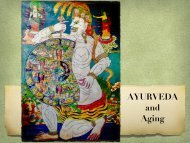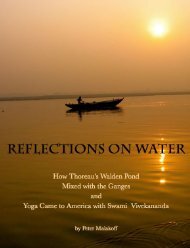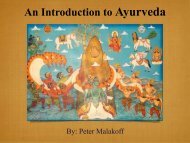How Thoreau's Walden Pond Mixed with the Ganges and Yoga Came to America with Swami Vivekananda
One early morning in 1846, during the coldest days of a New England winter, Henry David Thoreau looked out the window of his small cabin on Walden Pond and saw men cutting its ice into blocks. That ice was hauled by horse to a railroad that ran across the western edge of Walden Pond, packed into a boxcar, taken to Boston and loaded onto a clipper ship that sailed to Calcutta, India, arriving about four months later. Once there, that ice was purchased by grateful members of the East India Company. Thoreau had witnessed a small part of the global ice trade between New England and India that took place during the latter part of the nineteenth century. When Thoreau considered the ice trade, his vision sailed on metaphors far beyond the scope of business. The waters he imagined flowed both east and west and carried not just natural elements, but culture, religion and philosophy as well. He envisioned that after arriving in Calcutta, the New England ice of Walden Pond would eventually melt and run downhill where it would join with the sacred water of the Ganges. He wrote in Walden: "It appears that the sweltering inhabitants of Charleston and New Orleans, of Madras and Bombay and , drink at my well. In the morning I bathe my intellect in the stupendous and cosmogonal philosophy of the , since whose composition years of the gods have elapsed, and in comparison with which our modern world and its literature seem puny and trivial; and I doubt if that philosophy is not to be referred to a previous state of existence, so remote is its sublimity from our conceptions. I lay down the book [Bhagavad-Gita] and go to my well for water, and lo! there I meet the servant of the Bramin, priest of and and who still sits in his temple on the Ganges reading the , or dwells at the root of a tree with his crust and water jug. I meet his servant come to draw water for his master, and our buckets as it were grate together in the same well. The pure Walden water is mingled with the sacred water of the Ganges." This book tells the story of these waters . . .
One early morning in 1846, during the coldest days of a New England winter, Henry David Thoreau looked out the window of his small cabin on Walden Pond and saw men cutting its ice into blocks. That ice was hauled by horse to a railroad that ran across the western edge of Walden Pond, packed into a boxcar, taken to Boston and loaded onto a clipper ship that sailed to Calcutta, India, arriving about four months later. Once there, that ice was purchased by grateful members of the East India Company. Thoreau had witnessed a small part of the global ice trade between New England and India that took place during the latter part of the nineteenth century.
When Thoreau considered the ice trade, his vision sailed on metaphors far beyond the scope of business. The waters he imagined flowed both east and west and carried not just natural elements, but culture, religion and philosophy as well. He envisioned that after arriving in Calcutta, the New England ice of Walden Pond would eventually melt and run downhill where it would join with the sacred water of the Ganges. He wrote in Walden: "It appears that the sweltering inhabitants of Charleston and New Orleans, of Madras and Bombay and , drink at my well. In the morning I bathe my intellect in the stupendous and cosmogonal philosophy of the , since whose composition years of the gods have elapsed, and in comparison with which our modern world and its literature seem puny and trivial; and I doubt if that philosophy is not to be referred to a previous state of existence, so remote is its sublimity from our conceptions.
I lay down the book [Bhagavad-Gita] and go to my well for water, and lo! there I meet the servant of the Bramin, priest of and and who still sits in his temple on the Ganges reading the , or dwells at the root of a tree with his crust and water jug. I meet his servant come to draw water for his master, and our buckets as it were grate together in the same well. The pure Walden water is mingled with the sacred water of the Ganges."
This book tells the story of these waters . . .
Create successful ePaper yourself
Turn your PDF publications into a flip-book with our unique Google optimized e-Paper software.
ano<strong>the</strong>r frog that lived in <strong>the</strong> sea came <strong>and</strong> fell in<strong>to</strong> <strong>the</strong> well.<br />
'Where are you from? 'I am from <strong>the</strong> sea.' 'The sea! <strong>How</strong> big is<br />
that? Is it as big as my well?' <strong>and</strong> he <strong>to</strong>ok a leap from one side of<br />
<strong>the</strong> well <strong>to</strong> <strong>the</strong> o<strong>the</strong>r. 'My friend,' said <strong>the</strong> frog of <strong>the</strong> sea, 'how do<br />
you compare <strong>the</strong> sea <strong>with</strong> your little well?' Then <strong>the</strong> frog <strong>to</strong>ok<br />
ano<strong>the</strong>r leap <strong>and</strong> asked, 'Is your sea so big?' 'What nonsense you<br />
speak, <strong>to</strong> compare <strong>the</strong> sea <strong>with</strong> my well' 'Well, <strong>the</strong>n,' said <strong>the</strong> frog<br />
of <strong>the</strong> well, ‘nothing can be bigger than my well; <strong>the</strong>re can be<br />
nothing bigger than this; this fellow is a liar, so turn him out . . .'<br />
“That has been <strong>the</strong> difficulty all <strong>the</strong> while. I am a Hindu. I am<br />
sitting in my own little well <strong>and</strong> thinking that <strong>the</strong> whole world is<br />
my little well. The Christian sits in his little well <strong>and</strong> thinks <strong>the</strong><br />
whole world is his well. The Mohammedan sits in his little well <strong>and</strong><br />
thinks that is <strong>the</strong> whole world. I have <strong>to</strong> thank you <strong>America</strong> for <strong>the</strong><br />
great attempt you are making <strong>to</strong> break down <strong>the</strong> barriers of this<br />
little world of ours, <strong>and</strong> hope that, in future, <strong>the</strong> Lord will help you<br />
<strong>to</strong> accomplish your purpose."<br />
The frog who comes from <strong>the</strong> ocean represents <strong>the</strong> Living Realization of<br />
God. <strong>How</strong>ever, this is not <strong>the</strong> reality of <strong>the</strong> frog who lives in <strong>the</strong> well; because<br />
of his lack of experience, this “well-frog” overestimates what he thinks he<br />
knows <strong>and</strong> is unaware of how little he actually does. Vivekan<strong>and</strong>a is speaking<br />
of how this difference in experience is <strong>the</strong> root of <strong>the</strong> points of view <strong>the</strong>y are<br />
arguing about. He is not suggesting ano<strong>the</strong>r belief. He is calling for greater<br />
experience, <strong>the</strong> experience of God. Such Realization is extraordinarily rare<br />
<strong>and</strong> involves <strong>the</strong> sacrifice of self – <strong>the</strong> transcendence of mind, attention <strong>and</strong><br />
point of view. His<strong>to</strong>ry has shown that very few have ever done so or even been<br />
interested. It should humble us all.<br />
88


















